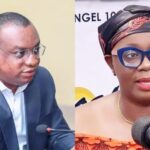
Ellen Ama Daaku, an NPP communicator and aide to former Vice President Dr. Mahamudu Bawumia, has raised a timely concern during her appearance on Angel FM on November 17, 2025.
Her critique highlights a perceived over-reliance on gold in the government’s projected funding for the 2026 fiscal year, questioning why other key revenue streams—like bauxite, oil, cocoa, and even agricultural exports such as mangoes—weren’t emphasized more prominently in the budget statement presented by Finance Minister Cassiel Ato Forson on November 13.
This reflects broader debates in Ghanaian economic circles about diversification.
The budget, themed “Consolidating the Gains for Accelerated Transformation,” projects total revenue and grants at GH¢232.5 billion, with expenditures at GH¢278.9 billion, leading to a fiscal deficit of 3.1% of GDP (down from 4.2% in 2025). Gold indeed dominates the narrative as a “powerhouse” for recovery.
Ghana earned $5.2 billion from gold in the first four months of 2025 alone—a 76.4% surge year-on-year—fueling much of the projected non-tax revenue growth to GH¢45.6 billion (up 28.5% from 2025). The government attributes this to increased production (from large-scale mining and the Domestic Gold Purchase Programme) and high global prices, positioning gold as a stabilizer post-IMF bailout.
Officials argue it’s pragmatic because Gold’s reliability helped “power Ghana’s recovery,” with exports hitting record highs and contributing to foreign exchange reserves climbing to $11.4 billion by mid-2025. However, critics like US-based economist Dr. Dennis Nsafoah warn of a “gold trap”—over-dependence could spell disaster if prices drop (as seen in past cycles), echoing Ama Daaku’s call for proactivity.
Daaku’s mention of alternatives like bauxite, oil, mangoes, and more underscores a push for balance.
Cocoa earnings rose to $1.2 billion in early 2025 (up 15%), with projections for GH¢12.4 billion in exports. The budget allocates GH¢2.5 billion for Cocobod to revive the sector amid global price volatility and smuggling issues.
Oil, which output declined (from 170,000 to 120,000 barrels/day) limits it to ~GH¢8.7 billion in projections, came down 5% from 2025. The budget notes value-addition efforts like petrochemicals but doesn’t spotlight it as a growth driver.
On bauxite, the budget eyes GH¢1.2 billion from mining royalties, with plans for a refinery under the Ghana Integrated Aluminium Development Corporation. Production is ramping up (to 2 million tonnes/year), but it’s not yet a fiscal heavyweight.
On Agriculture (e.g., Mangoes), non-traditional exports like mangoes, pineapples, and cashews are grouped under “other exports” at GH¢4.5 billion, up 12%. The Planting for Food and Jobs Phase II gets GH¢1.8 billion, but Daaku’s point holds— these aren’t framed as core funders compared to gold. Broader agribusiness could generate more if irrigation and processing improve.
GoldBod Dismisses Reports of Buying Gold Below Market Value
While gold has been a “lifeline” (e.g., covering 68% of import bills in Q1 2025), sustainability demands spreading risks. The IMF has praised Ghana’s stabilization but stressed structural reforms—like boosting bauxite value chains and agribusiness—to avoid boom-bust cycles. Politically, as an NPP voice, her comments add to opposition scrutiny ahead of parliamentary debates, where MPs like Dr. Dickson Adomako Kissi have already flagged opportunity costs in levy abolitions.
If the government heeds this, 2026 could pivot toward inclusive growth. For now, it’s a reminder: Gold shines bright, but Ghana’s economic necklace needs more gems.





